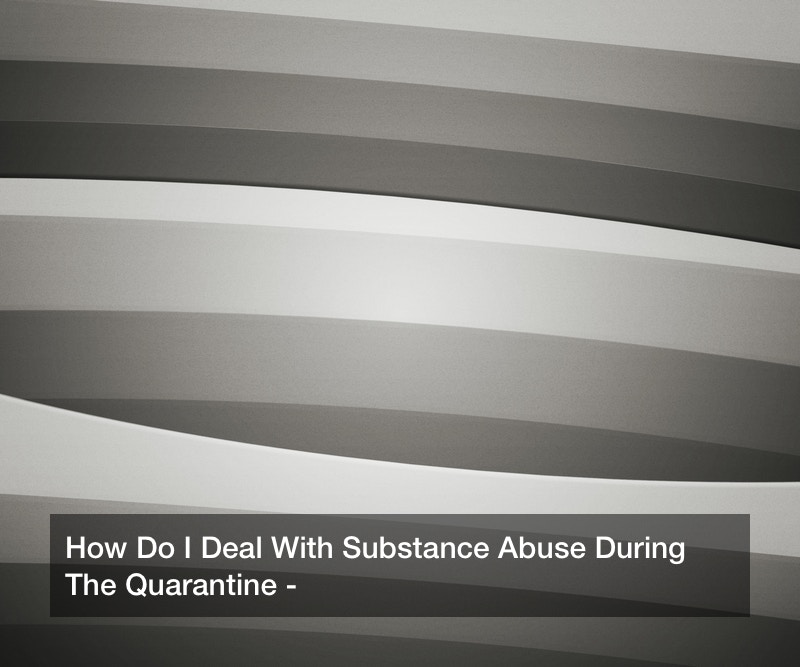

The COVID-19 pandemic has thrown a lot of systems off balance. It’s bad enough during flu season; the 2017-2018 flu season alone saw over 80,000 people die according to the CDC, and COVID-19 is certainly a more severe problem. Institutions and practices that we once relied upon and treated as a basic part of life are now completely off-kilter. Furthermore, our routines are no longer what they once were. Rather than going to work or school and seeing people on a daily basis, many of us are confined in our homes all day. For some, this isn’t too much of a departure from their typical everyday lives; for others, this is a major change and is emotionally devastating. Many healthy habits we used to keep ourselves mentally and physically fit are no longer accessible. This means that it can be difficult to stay away from bad habits, or for that matter slipping into new ones that aren’t good for us. It’s not healthy to stop social distancing anytime soon; however, that doesn’t mean that there aren’t going to be negative side effects. Social distancing can be viewed as a kind of treatment that comes with risks of its own. One of the biggest risks that people must live with while social distancing is falling back into substance abuse issues, or beginning new ones. Furthermore, we’re so isolated that while it’s already difficult to recognize the common signs of substance abuse in ourselves, we aren’t around many of the people who would notice those signs within us.
There are so many risk factors surrounding substance abuse during quarantine. For example, many recovering addicts who would normally be able to turn to sober living facilities now must stay at home. While there are few businesses still open in many regions, grocery stores that sell wine and indeed liquor stores themselves are still accessible within quarantine. For that matter, quarantine certainly hasn’t put a damper on the illegal drug industry. Drugs are as accessible as ever, and if anything even more people are turning to illegal drugs as a way to make money as their current jobs become unavailable. While you’re at home, you’ll also be more tempted to pass the time with unhealthy activities. Even if you’re working from home, checking into a virtual office isn’t quite the same thing as driving to a real one. You may be tempted to overindulge in alcohol simply because you don’t have anywhere to be and you need a distraction. What may begin as a few more drinks than what you’re used to could easily spiral out of control, and last well beyond quarantine. With that being said, let’s explore the main unexpected side effects of quarantine: substance abuse.
What Are The Common Signs Of Substance Abuse In Quarantine?

It’s much easier to notice the common signs of substance abuse outside of quarantine versus within. Slurred speech or unusual behavior like exaggerated sluggishness or hyperactivity can be a sign that an individual is abusing substances, whether they are legal or illegal. Furthermore, substance abuse is often caught during more serious circumstances, including car accidents. Many people are caught driving under the influence while seeking auto accident injuries treatment in the emergency room. However, there isn’t as much of a reason to drive now as there was before quarantine. This is, in fact, a big reason why a lot of people excuse abusing substances; they rationalize that they won’t be a danger to others. Nonetheless, their reckless behaviors will likely extend after quarantine.
If you know that you’re prone to substance abuse issues, you should be careful to monitor yourself while social distancing. It’s just as important, if you lack those predispositions yourself, to monitor your loved ones if you’re quarantining with them. Even if you’re separated from those that you love during quarantine, you can still look out for the common signs of substance abuse. Try to check in with the people you love every day, through video chats like Skype or Facetime. We’re fortunate that it’s currently easier to stay in touch with the people we care about than it ever was before. While it’s a little easier to put on a show in front of people when you’re simply talking on the phone or video chatting, there are certain signs that can tip concerned loved ones off to a serious issue. Strong mood swings, such as veering from extreme optimism to irritability, can be among the common signs of substance abuse. Another major sign would be missing appointments to talk, or making a sudden change in plans. People who continue to work remotely during quarantine may start slacking off, or may even be tempted to quit their jobs despite the importance of maintaining a paycheck during quarantine, when jobs are unusually scarce.
There are also risk factors associated with substance abuse during quarantine, apart from having previous substance abuse issues. Those who dealt with mental health issues before quarantine could easily start self-medicating with drugs and alcohol. People with depression, in particular, are currently being thrown off balance, and the isolation of quarantine may lead to them trying to lift their lowered moods through alternative methods. If someone with depression is acting particularly unusual or seems to lack coping skills, you should begin looking for other common signs of substance abuse.
What Can I Do To Prevent Substance Abuse During Quarantine?

There are a lot of steps you can take to prevent substance abuse issues from starting in the first place. For one thing, you should take note of all of the risk factors mentioned above, and double down if you or a loved one presents them. But also remember that anyone can fall prey to addiction. Nobody is free of risk. Therefore, you need to start strong and begin managing the stress that can lead to unhealthy coping strategies. Sleep is one of the first things to go during a stressful situation like quarantine, and a lack of sleep will only lead to greater irritability and more stress in turn. Therefore, you should set a strict time to go to bed, and a strict time to wake up; oversleeping during quarantine could do more harm than good as well, as it will lead to a lowering of productivity levels. Aim for eight hours if possible, and at least seven otherwise. Eat three solid meals each day, and try to stick with healthier foods. Yes, takeout may be tempting, but the routine of cooking for yourself and eating healthy meals is important to maintain. You may be tempted to overeat during quarantine as well; though this can be difficult to avoid with more free time in mind, try to stay away from snacking between meals. In fact, thinking outside of the box and creating more adventurous meals may very well end up becoming a valuable coping skill for you or your loved ones!
Coping skills, in general, are important to help prevent and combat some of the most common signs of substance abuse. A major way to avoid addiction to substances during quarantine is to develop a “healthy” addiction, which is to say a hobby or routine that takes the place of substances. It can be difficult to stay motivated and healthy during quarantine, but taking the extra time that you have and dedicating it to exercise will not only keep you from indulging in substance abuse but offer potentially better health than you had before quarantine began. Of course, if you have a chronic illness or simply don’t find exercise to be a good enough distraction, you may need to look into other healthy habits. Try taking up a hobby, like writing, reading, or creating visual art. You could take this time to learn to paint, or sculpt, or maybe even knit. Think about something you’ve always wanted to do that you could accomplish at home. Have you long wanted to learn a foreign language? Now is the time. If you’ve always had the impulse to study for exams necessary to get into graduate school, you may very well be at just the right point to handle that.
It’s important to try to look at the positives of having extra time on your hands, even if they come with negatives. A lot of people are dealing with unemployment, which can be hugely depressing, and a major trigger for many of the common signs of substance abuse. However, now more than ever you have time to look into not only new jobs but potentially new career options. Yes, a lot of us have been thrown off balance and that’s never easy to deal with. But right now, it’s important to try to focus on the positives.
There are other things to take into consideration when trying to cope with quarantine. You don’t have to just stick to talking to family and friends over social media and video chats. There are also telehealth options available. You can still seek the same psychiatric help and therapy that you did before quarantine, chatting with your providers through video conferencing technology and finding a way to adjust while at home. Many telehealth options are currently being covered for those on medicare, and this way you don’t have to experience an interruption in treatment. But what happens if, regardless of the help of your mental healthcare providers and your loved ones, you’re still dealing with addiction issues? How do substance abuse interventions and care work during quarantine?
How Do We Treat The Common Signs Of Substance Abuse During Quarantine?

Whether you’re a middle school teacher or a firefighter, everyone can fall prey to substance abuse problems. This is why it’s important that there are still treatment options available for those in quarantine. The Substance Abuse and Mental Health Services Administration, otherwise known as SAMHSA, offers a helpline to those dealing with substance abuse or mental health crises. This is available 24 hours a day and allows people to get referrals free of charge. Furthermore, if you’re dealing with a lowered income or lack health insurance, they can direct you to state-funded options that will be more accessible. You don’t have to spend a lot of money to get help when dealing with substance abuse problems.
Of course, as previously mentioned, it’s not as if you can easily access a rehabilitation center the way you would before quarantine. We can’t leave our houses and apartments to live in a rehab facility, at least not in the same straightforward sense that we would have before. If you’ve previously dealt with addiction and are now relapsing, you should immediately reach out to your sponsor; and if you’re trying to help someone who has relapsed, you may have to take this step for them. You may also be able to work with your substance abuse counselor remotely.
With that being said, not all rehab facilities are created equally. Depending on the facility that you prefer to work with, some do still offer in-patient services. It can be difficult to make the decision of whether or not this is the right option for you. However, many rehab facilities took the steps early to prevent the spread of the coronavirus, and they are no less safe than hospitals. For that matter, you can still social distance within these facilities. Evaluate each facility you’re considering carefully. But remember that in some cases, it could be more dangerous to stay at home while dealing with addiction than it would be to stay at a rehab facility.

It’s important to remember, throughout this pandemic, that you shouldn’t feel ashamed if you’re dealing with the common signs of substance abuse for the first time, or if you’re relapsing. There’s no shame in struggling with substance abuse. It happens to countless people across the world every day, and it’s only more likely to happen as we isolate from one another and cut ourselves off from our usual routines. Don’t hesitate to seek help, even if that means breaking from your usual tactics regarding social distancing, and don’t hesitate to ask for help from your loved ones. Ultimately, you have to do the right thing for yourself and your unique situation; and we all have to look out for each other. As soon as you begin experiencing the common signs of substance abuse, reach out. Take those first steps.


